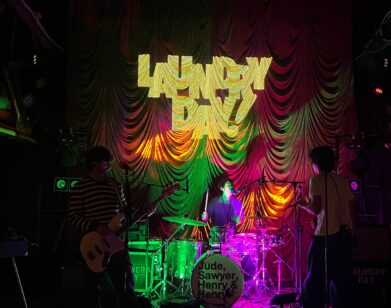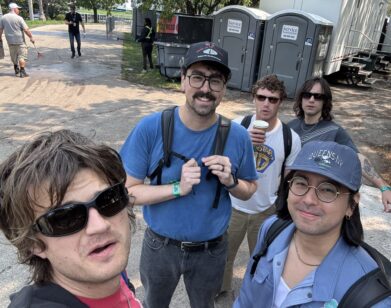TOUR DIARY
How Blondshell Became One of Her Generation’s Defining Rock Stars
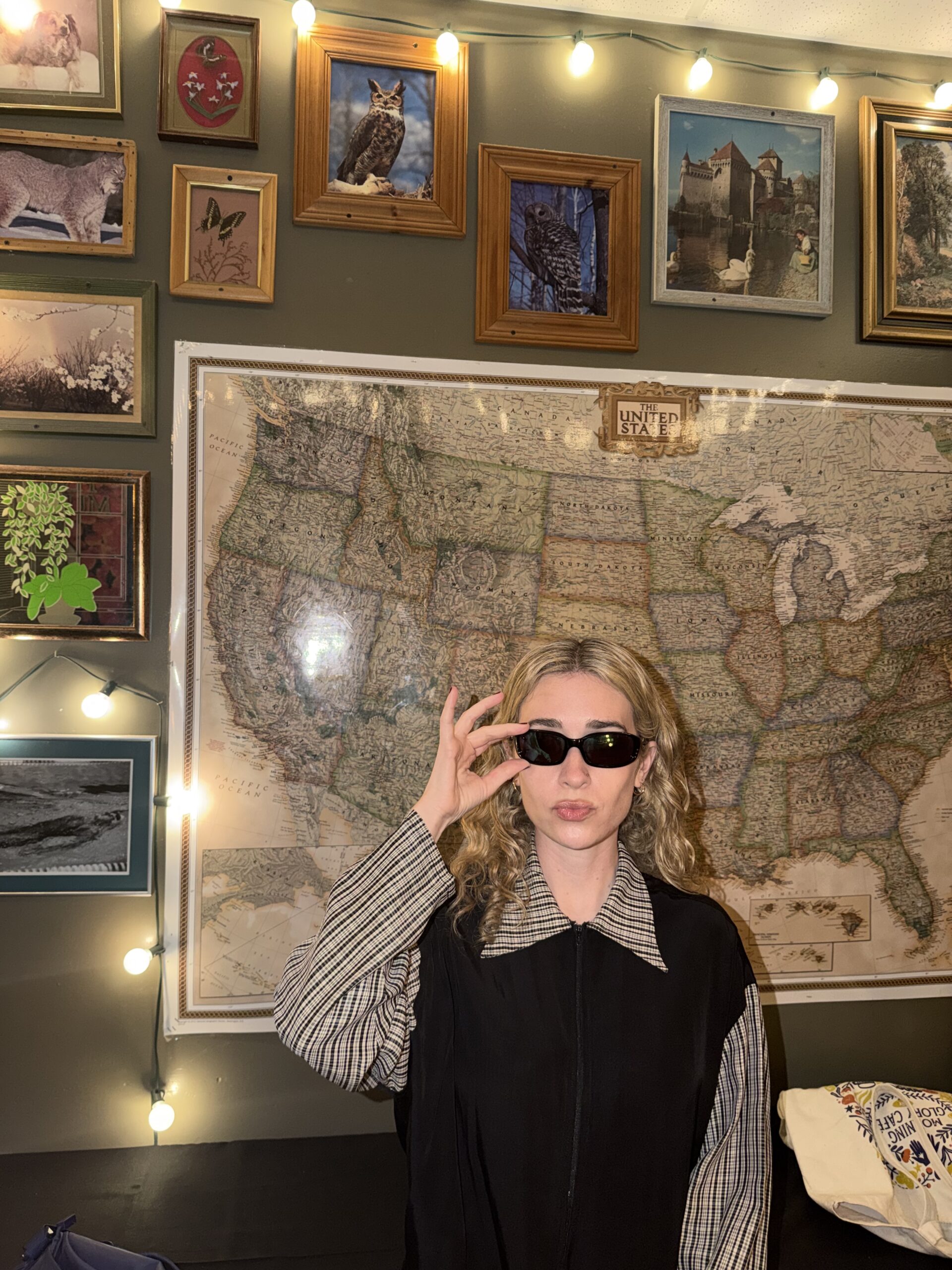
All photos courtesy of Blondshell
A few years ago, while sitting at dinner with her sister and tossing words around like Scrabble tiles, Sabrina Teitelbaum settled on a musical alter ego that felt right: Blondshell, an alias both vulnerable and protective. The indie rocker, known for her hit single Olympus, now sees the name as the beginning of her indie-rock journey of self-discovery. “We kept going back and forth,” she recalls, “and then at some point it was just brain association.”
Like her name, Blondshell’s songs come to her when life hits hard enough, compelling the 28-year-old New York native to sit down with pen, paper, and her baby Taylor guitar. Berlin, in particular, was a place where she felt something open up—”joy at an unusually high percentage,” she says. That moment became “Berlin TV Tower,” a fast, grungy burst of self-recognition and a pivotal turning point that led to Another Picture, the companion release to her Sophomore album, If You Asked for a Picture, which moves through themes of heartbreak, body image, and addiction (and welcomes collaborators like Gigi Perez, Conor Oberst, Samia, and Folk Bitch Trio into the fold). While touring her new music, she called us from the road to sound off on the cities that shape her, making music she’ll be proud of at 60, and her commitment to writing songs she actually gives a fuck about.
———
KENNEDY ENLOWSMITH: Where are you right now?
BLONDSHELL: I am in Carlsbad and we’re driving to Austin today. The day before that we played in Phoenix, so just another drive today.
ENLOWSMITH: How was playing in Phoenix?
BLONDSHELL: It was amazing. It was actually one of the best shows we’ve ever played. It was so fun. It was just really good energy.
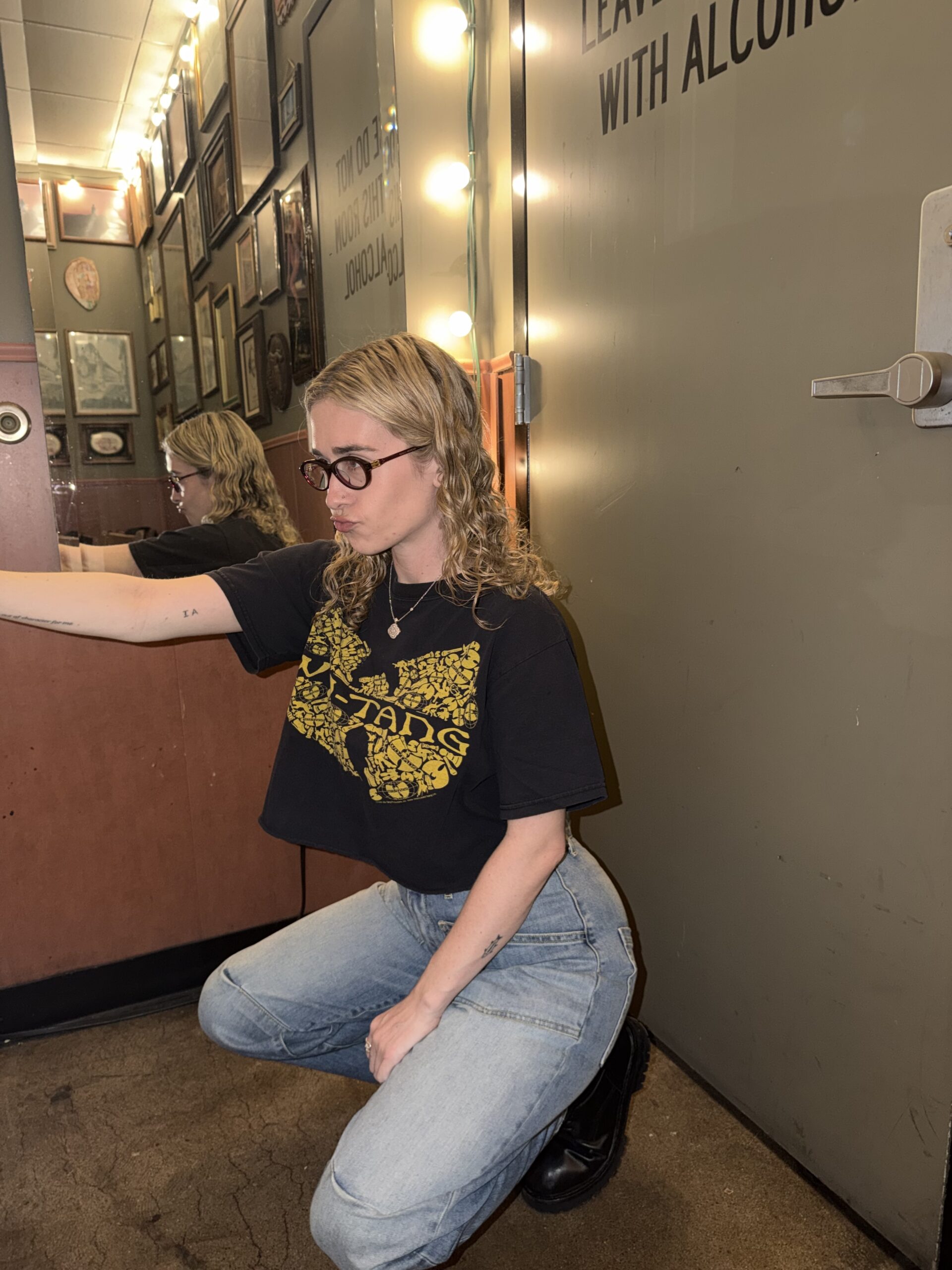
ENLOWSMITH: I know your album Another Picture is coming out in two days. First of all, congratulations on that. If You Asked For a Picture was released in May, but this new album’s a continuation. How does it feel to continue the story?
BLONDSHELL: It feels good. The thing is, it ends up being… You write songs that should really live in the same world but because of, “Oh, we had a deadline last year of October 1st,” and then you go and write a song in December and you’re like, “Oh, this would’ve been perfect on the album.” It just didn’t make it.
ENLOWSMITH: Yeah.
BLONDSHELL: So I have a song like that on it, which is “Berlin TV Tower.” Then we have a live version of one of the songs from Vevo. That feels important to me ’cause so much of my life is playing these shows and so much of how the songs exist is in live spaces. So it feels cool to have that, and then a bunch of artists that I really like.
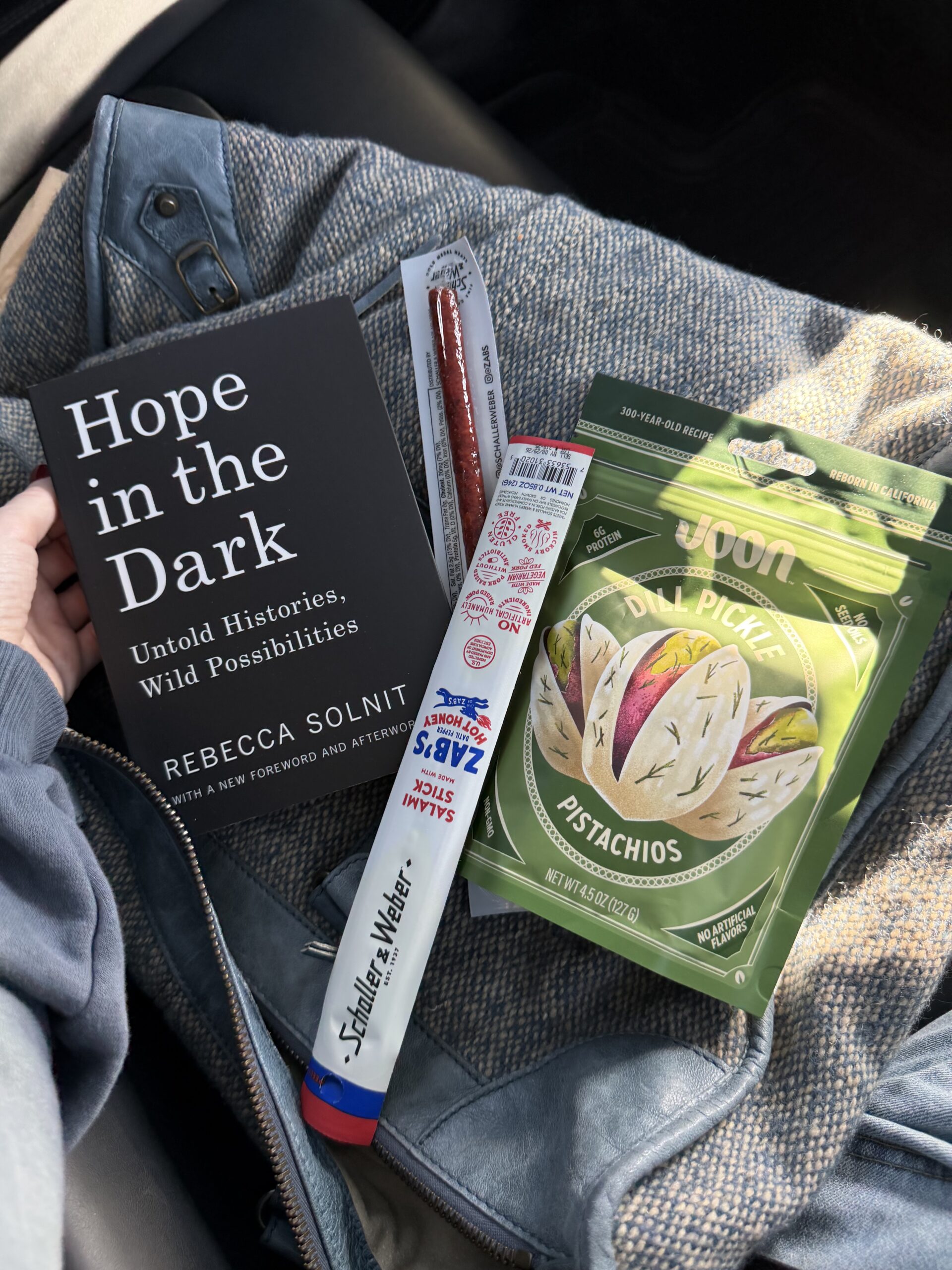
ENLOWSMITH: I saw you had the live version of your song “Thumbtack.” And I really like this choice because what you said, indie rock is such an energetically alive and raw genre. What influenced your decision to include that live version?
BLONDSHELL: I just felt proud of it, and that was one that I wanted to bring people back to. It takes on something new. Like, the melody is entirely different live. So having that version, it feels like another song.
ENLOWSMITH: Totally. I also felt that way when listening. I know you had some great collaborations on this album. What was it like working with Gigi Perez on “Arms”?
BLONDSHELL: Working with Gigi was great. I love Gigi. I listened to her music and I’m a fan, and we met online years ago. We both are obsessed with stacking vocals. We didn’t do it in person. So we were like, “Okay, we’re going to remotely record a bunch of vocals,” and both of us did a million stacks, and then we had to sift through it and pick, because we both sang so much on it.
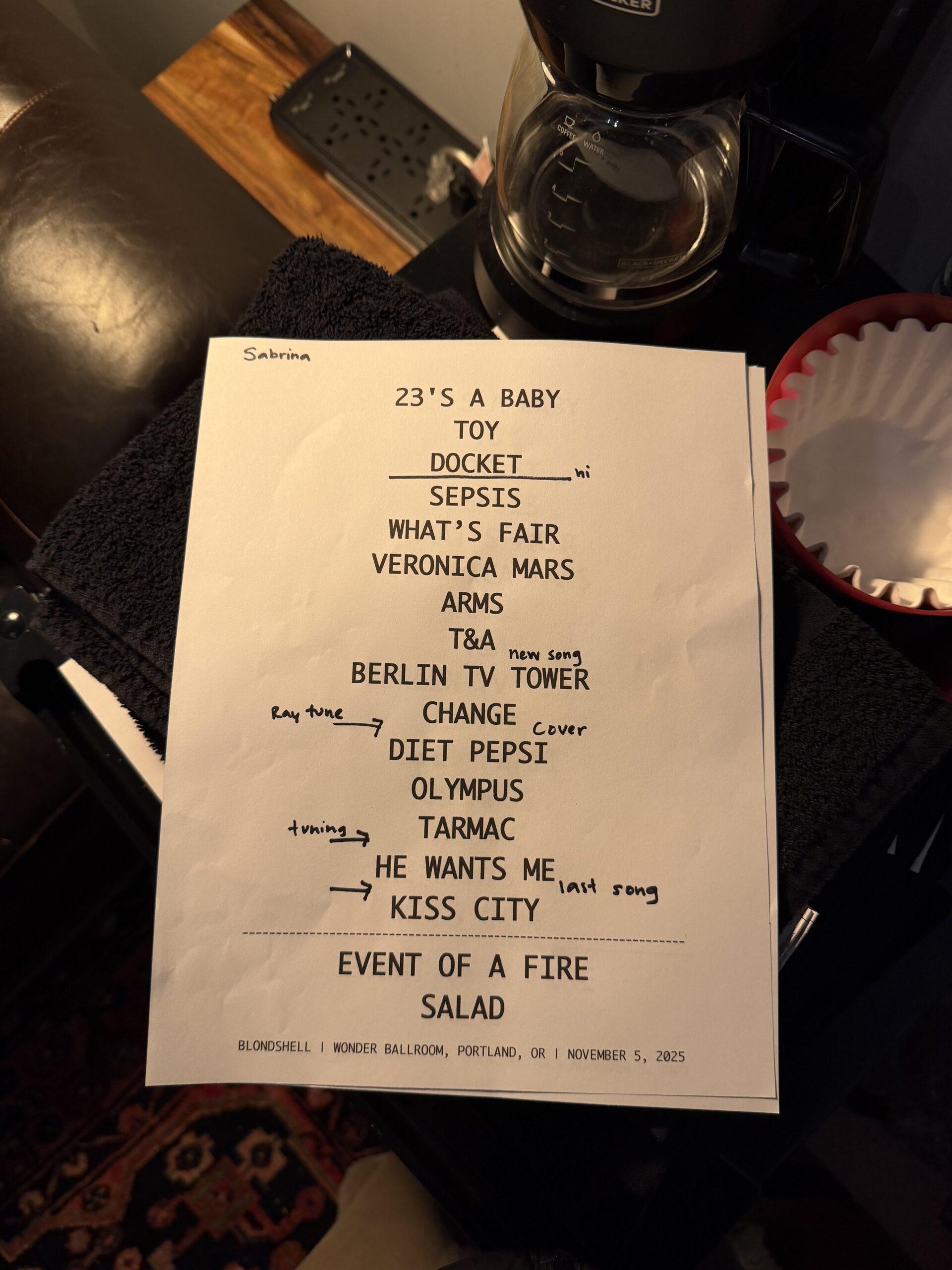
ENLOWSMITH: That’s awesome.
BLONDSHELL: It was like a puzzle. It was really cool.
ENLOWSMITH: You decided to include covers with Conor Oberst, Samia, Folk Bitch Trio. What was the inspiration behind including covers on the album?
BLONDSHELL: I wanted those people to do their own interpretations. I have always been a fan of when people do that with their albums. It’s not just Charli [XCX] last year. There’s a whole history of people doing that with their albums that I love. I mean, the Caroline Polachek song on Charli’s album, it made me obsessed with that song all over again. They’re portals. They’re new ways for people to discover songs.

ENLOWSMITH: Yeah, you’re letting your art be interpreted by other people. Also, the sound of this album feels a bit different from your first. What has inspired that shift?
BLONDSHELL: I felt like the first album was really one thing. It was one sound, and it was so succinct.
ENLOWSMITH: Totally.
BLONDSHELL: Then with the second album, there were more types of songs, and I felt more like I don’t have to be confined to this one type of guitar rock. I can do more. Also, I’m primarily a songwriter. My whole life I’ve been writing songs, so I always want to write the songs and then have the production and the sounds follow the songs as opposed to the other way around. So those are just the songs that I happened to write for my second album. And then we tried to have production that honored those songs.

ENLOWSMITH: Yeah. I love that everything’s empowered by the songwriting, ’cause I feel like so much music today is production done first and then people write the lyrics, but lyric-driven songs are so important and it’s kind of sad to see that there’s less of it today. It’s clear you have a very ’90s sound. I was wondering what your ’90s rock inspirations are?
BLONDSHELL: When I was making my first record, I was really obsessed with Hole, so I think that came across in the album so much. And then when I was making my second record, it didn’t feel as much like it had that sort of flavor of the ’90s, but I was listening to a lot of R.E.M, so I guess. But I think the second record feels less ’90s to me than the first record.
ENLOWSMITH: I know you do kind of channel the grunginess though. When I was listening to “Berlin TV Tower,” it’s a very fast song. It’s full of emotion. It’s grungy. I’d love to hear more about the process of writing it and your experience in Berlin.
BLONDSHELL: I’ve gone to Berlin a bunch of times for a tour. I just was there and I had an off day and I was walking around. Maybe the hormones were hitting or something, I don’t know, but I was just happy and felt like there was a lot of beauty around me. It wasn’t just like, “Wow, look at this beautiful city,” but I think sometimes my songs, if there’s a percentage of joy versus anger versus sadness, joy is always going to be the smallest percentage in my songs. I don’t know if you can hear it, but when I was writing the song, joy was sort of at an unusually high percentage.

ENLOWSMITH: I could totally tell. It feels very much like a song where you’re beginning to feel free after something that made you feel trapped.
BLONDSHELL: Yeah.
ENLOWSMITH: It’s like that moment of understanding and kind of realizing something new in yourself. Also, Berlin is such a free city as well, so I thought it was interesting. The city itself is kind of part of you growing into a new chapter in your life.
BLONDSHELL: Yeah, I think so too.
ENLOWSMITH: Do you have any pre-show rituals?
BLONDSHELL: I do. I stretch a little bit to get in my body, and I’ll have a normal conversation with somebody. And then the most important thing for me to remember is I think when you’re performing, it’s very easy to accidentally fall into it being an ego thing.
ENLOWSMITH: That totally makes sense.
BLONDSHELL: It’s really easy to go on stage thinking it’s about you and it’s almost impossible to have a good show when you’re focused on yourself.
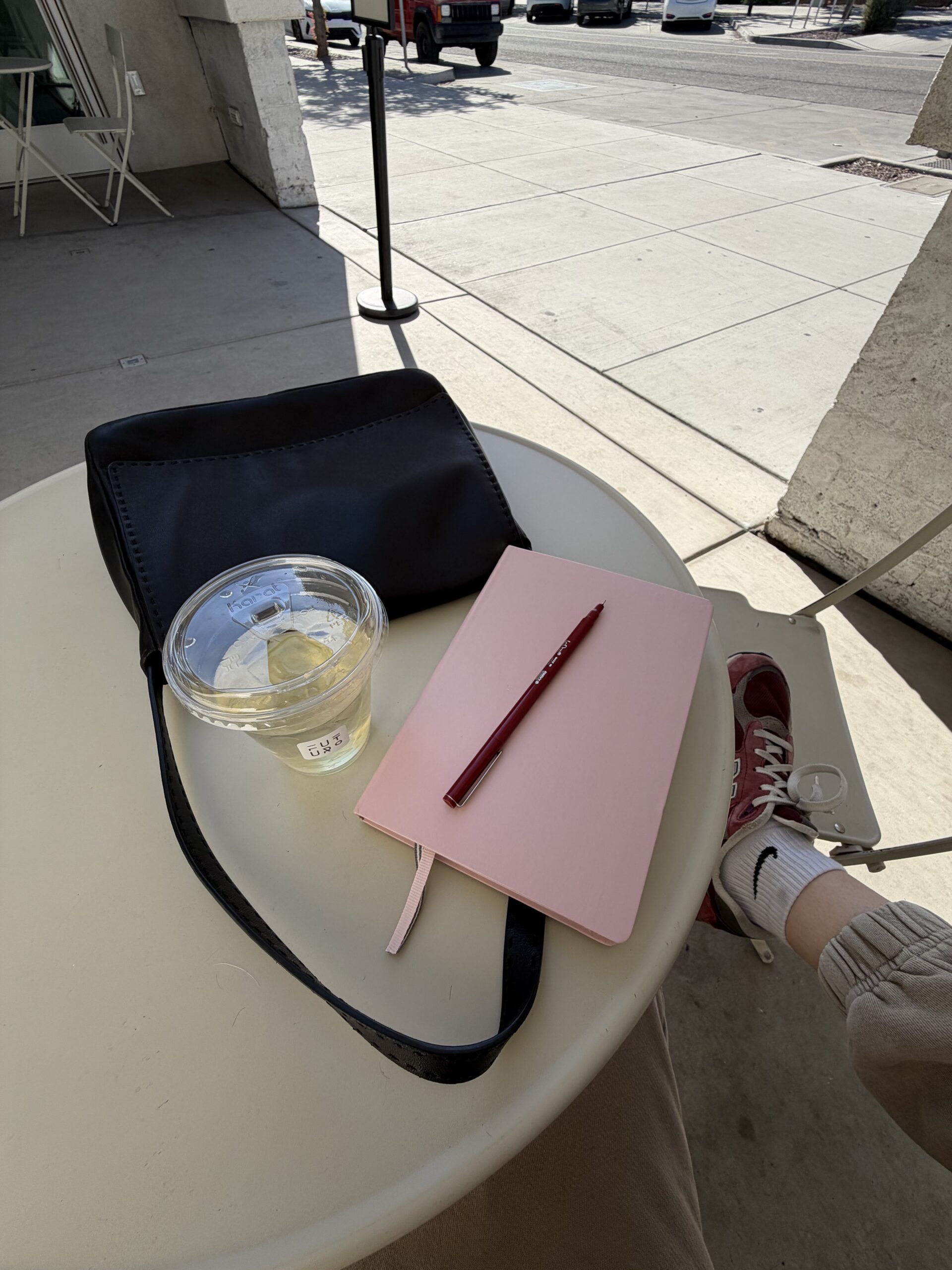
ENLOWSMITH: For sure.
BLONDSHELL: Because then you’re not thinking about the songs and you’re not thinking about connecting to people. The best shows that I’ve had in my life are always the shows where I’m sort of outside of myself. I played in Seattle in June, and it was one of my favorite shows to look back on because it felt like I didn’t feel this sense of, “People are watching me.” I felt like, “Hey, I’m watching you too. We’re all here.” Even though that kind of sounds simple and corny, it’s just making sure that I get into the headspace of, “This is not a thousand people looking at me. We’re all on the same side.”
ENLOWSMITH: Do you have moments where you will collaborate with the audience, bring people on stage? I know I see a lot of that in more recent concerts with different artists.
BLONDSHELL: I haven’t been doing it on this tour, but I have in the past.
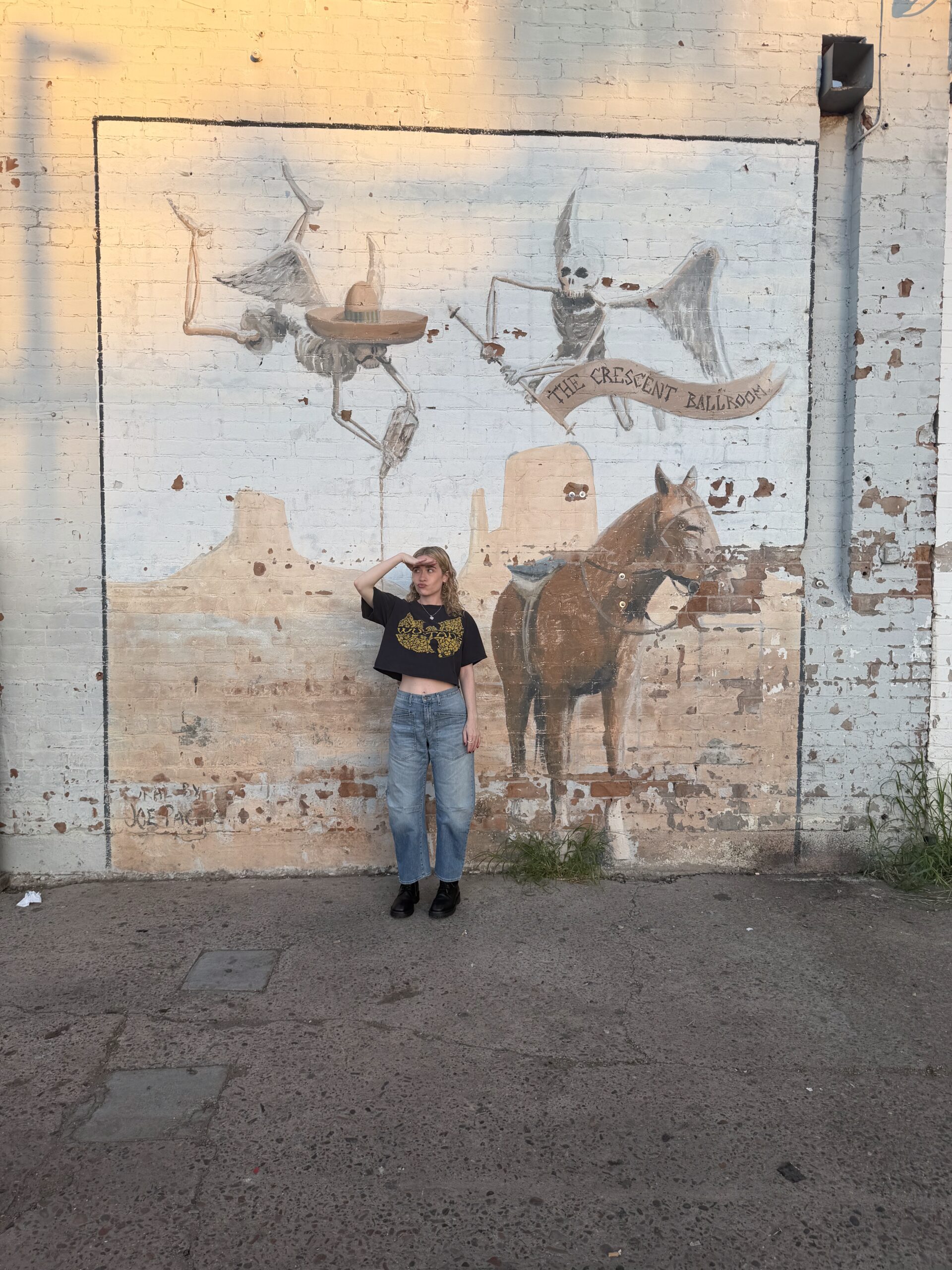
ENLOWSMITH: After a show, how do you decompress?
BLONDSHELL: It takes me a long time. I can’t go to bed right after I play, so I’ll take a hot shower, journal, FaceTime somebody, watch TV, listen to music. I try to do the stuff that I do at home before bed.
ENLOWSMITH: Totally.
BLONDSHELL: The boring stuff.
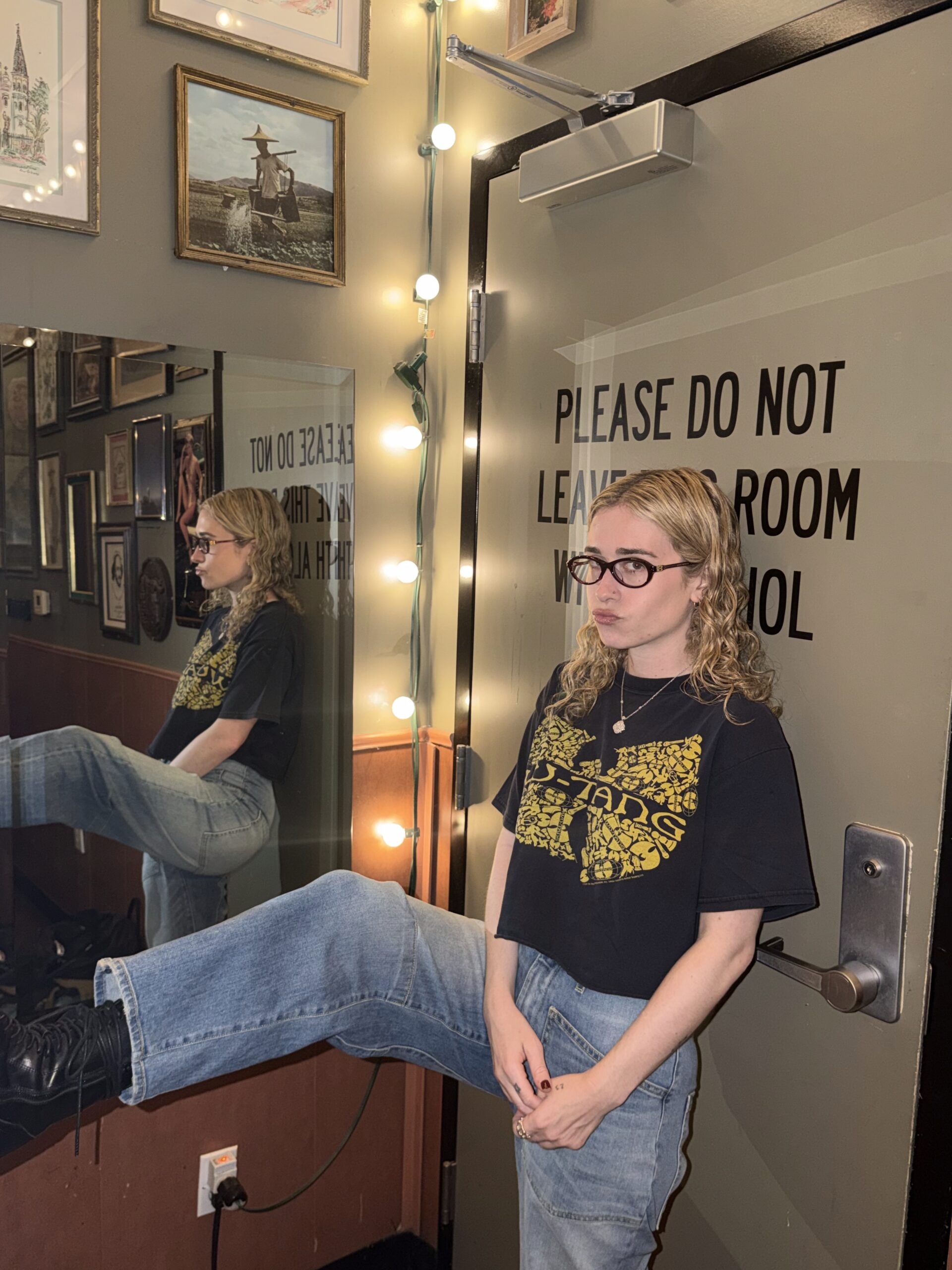
ENLOWSMITH: Performing is such a high, so it seems like it’d be very difficult to unwind after that.
BLONDSHELL: It’s harder to come down from the best shows. The best shows make you feel really wired. Shows that are eh, it’s easy to sleep after.
ENLOWSMITH: Are there any cities that you’re especially excited to perform in?
BLONDSHELL: We’re excited to go back to Austin, which is where we’re playing next because I have played there a lot, so I know some of the people going and I just really like playing there. I’m excited to go to some new places. We’ve played in Kansas City, but never a headline. Same with Detroit. Then there’s totally new places like Cleveland and Pittsburgh.
ENLOWSMITH: It’s very exciting. How did you land on the name Blondshell?
BLONDSHELL: My sister and I did. We were having dinner and I was like, “Okay, I need a stage name.” We kept going back and forth with things, and then at some point it was just brain association. Blonde. Shell. Blondshell.
ENLOWSMITH: It used to be Baum, right? You had a different artist’s name.
BLONDSHELL: Yeah, so during that transition.
ENLOWSMITH: I like it as a fellow blonde myself. You were talking about how your focus is the songwriting, then the production comes after. What’s your songwriting process like?
BLONDSHELL: It has to be really every day and normal. I know people who will go to special places to write or they’ll travel. I can’t do that. It has to be a very normal environment. I bring a small guitar. I have a baby Taylor, a really small guitar that I bring with me on tour, so I’ll write in hotels and at venues and stuff. Then when I’m at home, I’ll write in my room on guitar. I always write melody and lyrics at the same time, and then I’ll change some of the chords later on.
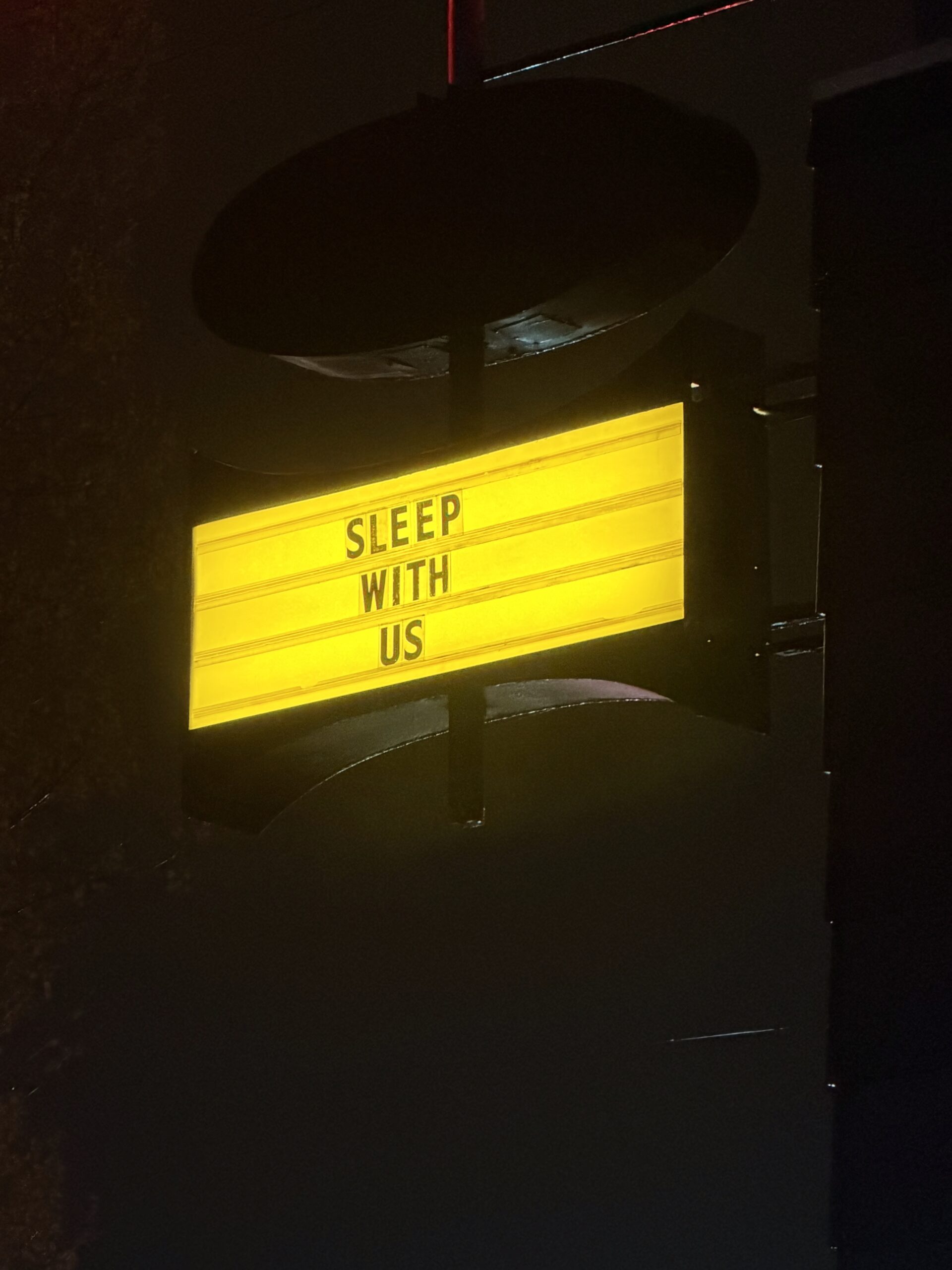
KENNEDY ENLOWSMITH: Do you ever feel pressured to write or not creatively inspired because of a feeling like you need to write something for a new project?
BLONDSHELL: I have felt that way before. The biggest thing is that right after I put an album out, which now is twice, but I’ll feel like, “Oh, I’m good. I don’t have to write for a really long time,” and then that’ll make me open to writing. So I have found that in the times where there’s no pressure at all, I happen to get the songs that I want.
ENLOWSMITH: That makes a lot of sense.
BLONDSHELL: I could never write under pressure because you get really bad songs that way. I experienced writer’s block where I’ll go six months without writing a song that I like and I won’t pick up an instrument.
ENLOWSMITH: For sure. I also write songs, and I’ve felt that way. Whenever I’m pressured to write something or get something done on a deadline, it feels so forced and doesn’t come out of you naturally. I feel like life experiences are really what draws me to songwriting, certain things that happen in my life. You mentioned the Taylor that you have. Is that your go-to guitar that you like to play with?
BLONDSHELL: So I have my acoustic baby Taylor, but that’s what I take on the road because it’s so small. And then I have a bunch of Tellys [Fender Telecaster] at home, so I guess I’m a Telly girl. It’s ’cause it’s bright, and it feels like the right shape for my body.
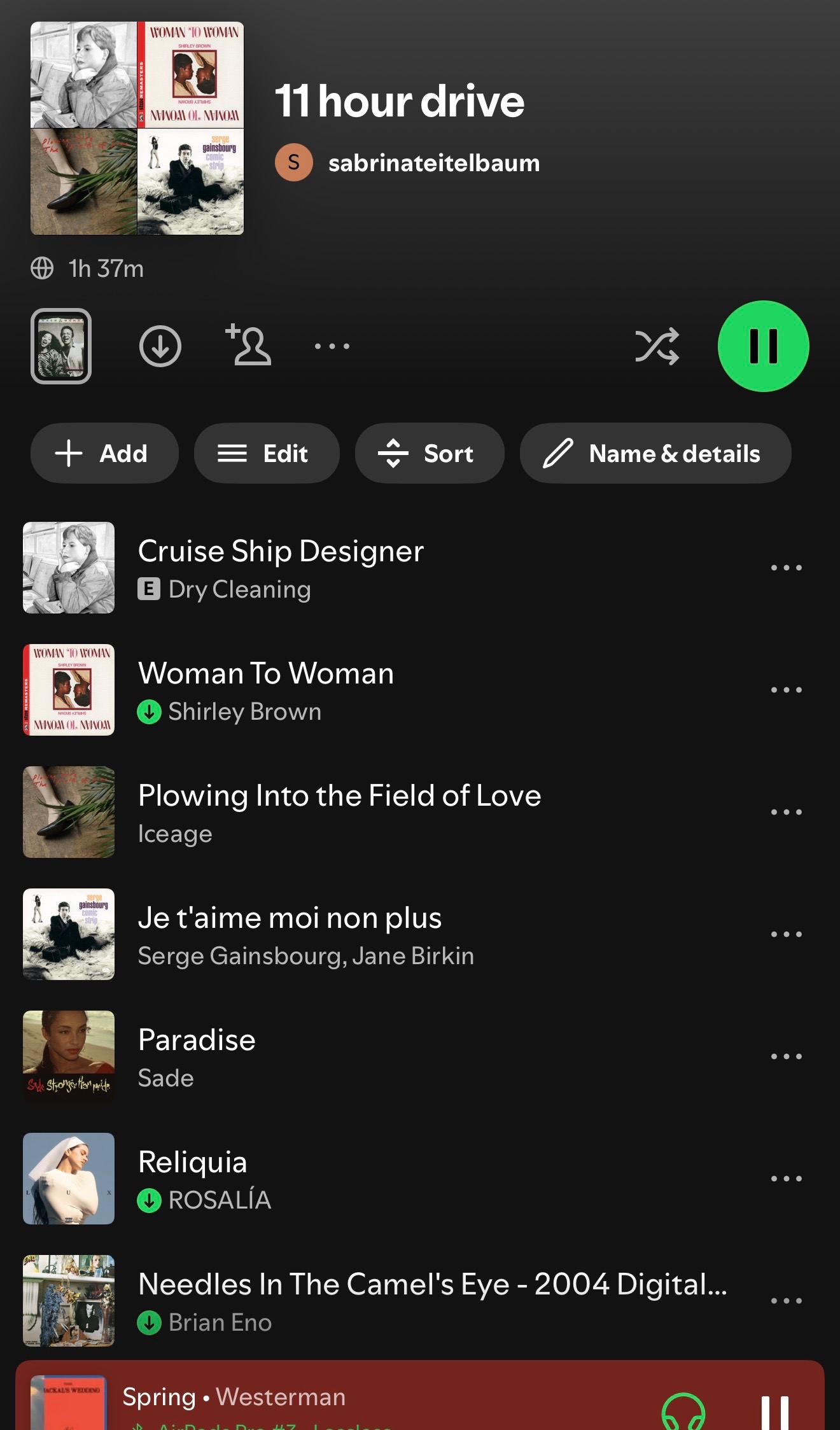
ENLOWSMITH: Do you play usually when you perform?
BLONDSHELL: No, never, because I only play guitar really as a tool to write. And I want to be really focused on singing, and I don’t want to feel like I’m trapped behind something. Some people feel so much more comfortable behind a guitar, but it makes me feel uncomfortable, so I don’t play live.
ENLOWSMITH: It’s also like you’re thinking about more than just the audience as well, and you’re also thinking about what you’re playing and it adds more to them.
BLONDSHELL: Yeah, it does.
ENLOWSMITH: My last question is what’s next for you? Where do you see your music heading in the future?
BLONDSHELL: I’m playing a bunch of festivals this year, and then I’m going to be focused on another album. I just want to keep making albums because I love playing shows and touring. But the reason that I do everything is because I enjoy making albums. And it feels like fulfilling in a way that I wouldn’t get from anything else in life. I want to look back when I’m 60 and have a body of a lot of music. I want to write songs that I give a fuck about and I’m proud of.




